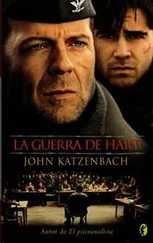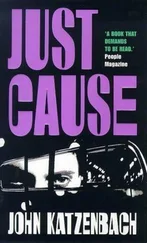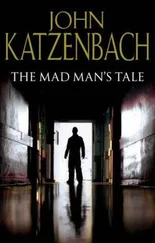And one other thing was abundantly clear to him: If Rumplestiltskin learned that he’d escaped, if he even suspected that Ricky still breathed air on this planet, he would be on Ricky’s trail instantly with evil intentions. Ricky doubted that he would have the opportunity to play any game the second time around. It also occurred to him how easy it would be to dispatch his new identity: Richard Lively was a nonentity in the world. His very anonymity made his own quick and brutal death a relative certainty. Richard Lively could be executed in broad daylight, and no policeman anywhere would be able to make the necessary connections leading him back to Ricky Starks and some man called Rumplestiltskin. What they would find out was that Richard Lively wasn’t Richard Lively and he would instantly become a John Doe, planted with little ceremony without a headstone in some potter’s field. Perhaps a detective would wonder idly who he truly once was, but, inundated with other cases, the death of Richard Lively would simply be shunted aside. Forever.
What made Ricky so safe, also made him utterly vulnerable.
So, upon his return to New Hampshire, he greeted taking up the simple routines of his life in Durham with unbridled enthusiasm. It was as if he hoped he could lose himself readily in the steadiness of getting up each morning and going to work with the rest of the janitorial force at the university, of swabbing floors, cleaning bathrooms, polishing hallways, and changing lightbulbs, exchanging a joke or two with coworkers, speculating about the Red Sox’s prospects for the upcoming season. He functioned in a world so insistently normal and mundane that it cried out to be painted in institutional pale blues and light greens. Once, when operating a steam cleaner across the carpet of the faculty lounge, he discovered that the sensation of the machine humming, vibrating in his hands, and the swath of clean rug that it created was almost hypnotically pleasant. It was as if he could disappear from who he once had been in the new simplicity of this world. It was a strangely satisfying situation; alone, a job that shouted out routine and regularity, the occasional night spent manning the telephone bank at the suicide prevention line, where he recalled his skills as a therapist, dispensing advice and throwing lifelines in a modest, controlled fashion. He discovered he didn’t much miss the daily deposit of angst, frustration, and anger that characterized his life as an analyst. He wondered, some, whether the people he’d known, or even his late wife, would recognize him. In a curious way, Ricky thought that Richard Lively was closer to the person that he had wanted to be, closer to the person who’d found himself in summers on the Cape, than Dr. Starks had ever realized treating the rich and powerful and neurotic.
Anonymity, he thought, is seductive.
But elusive. For every second that he forced himself to grow comfortable with who he was, the revenge persona of Federick Lazarus shouted contradictory commands. He renewed his physical fitness training, and spent his free hours perfecting marksmanship skills on the pistol practice range. As the weather continued to improve, bringing warmth and bursting with color, he decided he needed to add outdoor skills to his repertoire, so he signed up for an orienteering class operated by a hiking and camping company under the name of Frederick Lazarus.
In a way, he’d been triangulated, in much the same way one finds his location when lost in the woods. Three pillars: who he was, who he’d become, who he needed to be.
He asked himself, late at night, sitting alone in the near-darkness of his rented room, a single desk lamp barely denting the shadows, whether he could turn his back on everything that had happened. Simply abandon any emotional connection to his past and what had befallen him, and become a man of complete simplicity. Live paycheck to paycheck. Take pleasure in basic routine. Redefine himself. Take up fishing or hunting or even just reading. Connect with as few people as possible. Live life with monklike style and a hermit’s solitude. Turn his back on fifty-three years of life, and say that it all started anew from the day he’d set fire to his home on the Cape and gone forward from there. It was almost Zenlike and tantalizing. Ricky could evaporate from the world like a puddle of water on a hot, sunny day, rising into the atmosphere.
This ability was almost as frightening as the alternative.
It seemed to him that he had reached the moment where he had to make a choice. Like Odysseus, his screen name, the route lay between Scylla and Charybdis. There were costs and risks with each selection.
Late at night, in his modest rented room in New Hampshire, he spread out on his bed all the notes and connections he had to the man who had forced him to erase himself from his life. Bits and pieces of information, clues and directions that he could follow. Or not. Either he was going to pursue the man who’d done this to him, risking exposure. Or he was going to toss it all and make what life he could out of what he’d already established. He felt a little like some fifteenth-century Spanish explorer, standing unsteadily on the pitching deck of a tiny sailing ship, staring out at the wide expanse of deep green ocean and perhaps a new and uncertain world just beyond the horizon.
In the center of the pile of material were the documents that he’d taken from the old man Tyson on his death bed at the VA Hospital in Pensacola. In the papers were the names of the adoptive parents who had taken the three children in twenty years ago. That, he knew, was his next step.
The decision was: take it-or not.
A part of him insisted he could be happy as Richard Lively, maintenance man. Durham was a pleasant town. His landladies were nice enough folks.
But another part of him saw things differently.
Dr. Frederick Starks did not deserve to die. Not for what he’d done, even if wrong, at a time of his own indecision and doubt. There was no denying that he could have done better for Claire Tyson. He could have reached out and perhaps been the hand that helped her find a life worth living. He couldn’t debate that he’d had that chance and that he had missed it. Rumplestiltskin was right about that. But his punishment far exceeded his complicity.
And this thought infuriated Ricky.
“I didn’t kill her,” he said out loud, but whispering the words.
The room around him was as much a coffin as it was a life raft, he believed.
He wondered if he could ever take a breath of air, without it tasting of doubt. What sort of safety was there in hiding forever? Of always suspecting the person behind every window of being the man who had driven him to anonymity. It was an awful thought, he understood: Rumplestiltskin’s game would never end for him, even if it had ended for the elusive Mr. R. Ricky would not know, never be certain, never really have a moment’s peace, free from questions.
He needed to find an answer.
Alone in his room, Ricky reached for the papers on the bed. He rolled the rubber band that held the adoption documents together off the sheaf so quickly that it snapped.
“All right,” he said quietly, speaking to himself and to any ghosts who might have been listening in, “the game starts up again.”
What Ricky learned swiftly was that social services in New York City had placed the three children into a succession of foster homes for the first six months after their mother died, until they were adopted by a couple who lived in New Jersey. There was a single social worker’s report stating that the children had been difficult placements; that except for their last and unidentified foster home, they had proven to be disruptive, angry, and abusive in each group setting. The social worker had recommended therapy, especially for the oldest. The report was written in plain, bureaucratic cover-your-butt English, without the sort of detail that might have told Ricky something about the child who was to grow into the man who had tormented him. He did learn that the adoption was handled by the Episcopal Diocese of New York, under their charity wing. There was no record of money changing hands, but Ricky suspected some had. There were copies of legal documents relinquishing any claims on the children signed by old man Tyson. There was another document, from Daniel Collins, signed while he was in jail in Texas. Ricky noted the symmetry of that element: Daniel Collins had rejected the three children while in prison. Years later, he is returned to prison under the rough guidance of Rumplestiltskin. Ricky thought that however the man who was once a rejected child managed this feat, it must have given him terrific satisfaction.
Читать дальше












